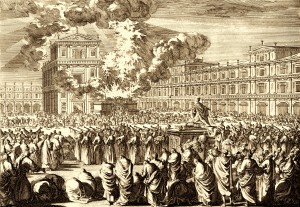Thoughts on Today’s Lessons for Sunday, Dec. 9, 2012.

Dedication of the Temple in ancient Jerusalem
We don’t often hear readings from Baruch, which is one of the “Apocryphal” or “Deuterocanonical books” found at the back of the Old Testament. Martin Luther dropped these books from the Protestant Bible, but we’re glad that Anglicans (and Catholics) chose to keep them. Legend holds that Baruch, who is mentioned briefly in Jeremiah, was a friend and scribe of the prophet. Here, Baruch speaks to Israel in exile, calling on the people to stop mourning and prepare to celebrate God’s glory in a promised return to Jerusalem. As Christmas nears, we prepare to celebrate the glory of the Incarnation.
Psalm 126
Baruch’s prophetic promise has been fulfilled, and this Psalm honors the occasion with shouts of joy. Historically, the emperor Cyrus of Persia, ruler of what was then the world’s most powerful empire, had taken power over Babylon and, in an act that would gain him a reputation for enlightened tolerance, allowed the Israelites in exile to return home to Mount Zion – Jerusalem – and rebuild the Temple. It was a dream fulfilled, and the people gave loud thanks to God. When our dreams are realized, do we remember to give thanks?
Second Reading: Philippians 1:3-11
In the formal style of Greek correspondence, Paul begins his letter to the people of Philippi in Greece with greetings, love, thanks for their friendship and prayers for their well-being. Recalling their eager acceptance of the Gospel, Paul prays for his Philippian congregation’s continued spiritual growth and insight, which he prays will lead them to a harvest of righteousness and justice in God’s love through Christ.
Gospel: Luke 3:1-6
Luke continues the story of John the Baptist, now grown and beginning his public life as a prophet “crying out in the wilderness.” He begins with a detailed roster of Roman and Jewish leaders of the time, perhaps as a way to underscore the reality of this prophet to his contemporary readers. Then he utters a prophecy of Isaiah, interpreting it as his call to “Prepare the way of the Lord … make his paths straight.” What can we do in our time to prepare the way for the message of Jesus?
